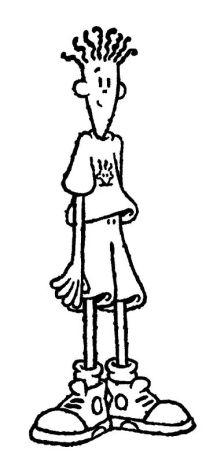Fido Dido
Fido Dido, the iconic mascot for 7 Up, originated as a cartoon character created by Joanna Ferrone and Sue Rose. Rose initially sketched Fido on a napkin in 1985, and the duo later produced T-shirts featuring the slogan "Fido is for Fido, Fido is against no one." In 1987, Fido was licensed to PepsiCo and began his role as a mascot, gaining widespread popularity in the 1990s. While Cool Spot served as 7 Up's mascot in the United States starting in 1988, Fido represented the brand internationally, quickly becoming a cultural sensation with his trendy style, relaxed demeanor, and quirky outlook on life.
Beyond 7 Up, Fido Dido has also been featured as a mascot for Slice in the U.S. and Fruko in Turkey, further showcasing his adaptability and appeal.
| Names | Fido Dido |
| Gender | Male ♂ |
| Race | Human |
| Occupation | Mascot |
| Origin | Napkin Drawing 1985 |
| Alignment | Good |
| Age | Unknown |
| Created By | Joanna Ferrone and Sue Rose |
Appearance
Fido Dido is depicted as a tall, slim, young cartoon character rendered in black and white. He has a triangular face with minimalist facial features—small marks for his eyes, nose, and mouth—and round ears on each side. His most recognizable feature is his spiky hair, typically drawn as eight wavy strands. Fido’s attire includes a white T-shirt often adorned with a simple rendition of his own face, white shorts, and matching sneakers.
The original Fido, traditionally animated since 1985, exudes a hand-drawn charm. A CGI version, introduced in the 2000s, presents a modernized take, with subtle changes to his design, including the color of his hair strands.
Personality
Fido Dido’s personality is as distinctive as his minimalist design. He embodies a laid-back, carefree attitude, exuding a sense of calm confidence and individuality. Fido’s approach to life is quirky and unconventional, reflecting a mindset of embracing simplicity and enjoying the moment. He is nonchalant and witty, often portrayed as an easygoing character who doesn’t take himself—or the world—too seriously.
Fido’s charm lies in his ability to be effortlessly cool without being flashy. His advertisements and promotional material emphasize creativity and optimism, showcasing his knack for handling situations with a mix of cleverness and whimsy. Despite his relaxed demeanor, Fido can be proactive when needed, as seen in his reality-bending antics that often solve problems with a playful twist.
Fido’s universal appeal stems from his relatability, encouraging people to embrace individuality, stay true to themselves, and find humor in life’s quirks.
History
In 1985, Sue Rose sketched the character that would become Fido Dido on a napkin at a restaurant. The following day, Joanna Ferrone conceived the name "Fido Dido" during her commute to work. The duo later stenciled Fido onto T-shirts, which quickly gained popularity in New York City. These shirts prominently featured Fido’s official mantra:
"Fido is for Fido. Fido is against no one. Fido is youth. Fido has no age. Fido sees everything. Fido judges nothing. Fido is smart. Fido is innocent. Fido is powerful. Fido comes from the past. Fido is the future."
Joanna Ferrone began purchasing T-shirts in bulk and hauling them to printers to have them silk-screened with Fido Dido designs. The unique designs soon caught the attention of fashion designer Patricia Fields, who displayed them in her boutique. The character quickly gained popularity, becoming an instant hit.
Fido Dido's world expanded to include a quirky family of characters, such as Fido’s Fido, Lido Dido, F.D., Boy Fido, Fido Doody, Video Dido, Danger Dido, Jo Dido, Fido Jerk, Fido Doodles, Howdy Dido, The Unknown Fido, Fido Boys, Dribble Dido, and Fido Gato. These characters were introduced in Fido Dido 101, Or, Living Life in the Third Lane, a collection of humorous drawings and gags created by Sue Rose and Joanna Ferrone without a traditional narrative structure.
To manage the growing brand, Joanna and Sue founded Fido Inc. and partnered with United Media Licensing, enabling the character to be licensed worldwide across a variety of merchandise. Fido Dido became a cultural phenomenon, appearing on T-shirts, pants, shoes, watches, cups, towels, stationery, dolls, shampoo, and cologne. His merchandise was stocked by prominent retailers like Macy’s, Nordstrom, Bloomingdale’s, Marshall Field’s, Ivey’s, and JC Penney’s, eventually spreading globally.
After being licensed to PepsiCo in 1987, Fido began promoting 7 Up. In his advertisements, Fido displayed a unique ability to manipulate and reshape reality, often reversing changes imposed on him, adding a whimsical and surreal touch. During the early 1990s, Fido, along with his friends and family, appeared in sponsorship bumpers for CBS Saturday morning cartoons. He also briefly served as the mascot for the lemon-lime flavored Slice in the U.S.
Fido Dido continued to represent 7 Up internationally until 1995. In the early 2000s, he returned in CGI form, focusing exclusively on 7 Up’s global campaigns. His reality-bending antics remained a central theme in advertisements, even as his family and friends were phased out. This CGI version of Fido was featured until 2011, when PepsiCo rebranded 7 Up outside the U.S.
In 2015, Fido Dido made a nostalgic comeback in the UK and Ireland, gracing retro-style cans of 7 Up Free, a nod to his 1990s design.
Trivia
- Fido also appeared in Logorama as a bystander.
- The graphic novel Fido Dido: Life In the Third Lane was published in paperback in 1989.
- In the early 1990s, a large mural of Fido Dido was painted on the side of a building in Guayaquil, Ecuador. Over time, the mural faded, but after a news article in El Universo in March 2019 brought attention to it, the mural was repainted to restore its original vibrancy.
- In 1992, Fido Dido appeared in his own magazine in the United Kingdom. The inaugural issue, titled Meet the Fidos, introduced his extended family and was published by Ravette Publishing.
- A video game titled Fido Dido was developed by Kaneko and Bits Studios in 1993 for the Super NES and Sega Genesis. However, it was never released due to the closure of Kaneko's United States branch in 1994.
- Fido Dido was also featured in a Neopets-sponsored game, though details are scarce.
- In the early 1990s, Fido Dido had a comic strip in the teenage magazine YM. A spinoff of the strip, Pepper Ann, was later adapted into a Disney animated television series.
Commercials


